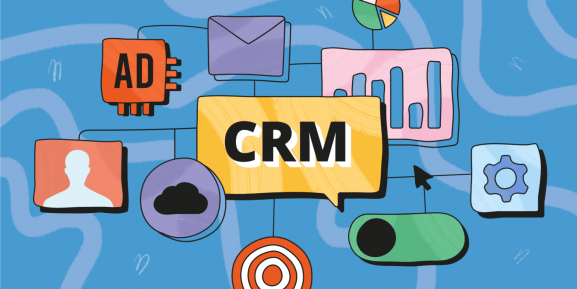With the business environment more competitive now than ever before, businesses need all the possible advantages they can get. One of the main ways to gain this competitive advantage is by making your business processes more efficient through the use of a CRM.
But which CRM are you supposed to get? Without the necessary experience it can be challenging to make a decision. However, there’s no need to worry. Today we’re going to be looking at how two leading CRM platforms, Salesforce and Zoho, compare against each other.
To understand the Salesforce vs Zoho debate, it’s important to understand what a CRM is and how it impacts businesses. CRM stands for customer relationship management, and is a platform that helps store and organize all customer data into one repository.
By then using that data, organizations can optimize different business processes and store data effectively. Salesforce and Zoho are two of the best platforms and will definitely rank highly in any list of best CRMs that you see.
In this article, we’ll cover everything that you need to know about the Salesforce vs Zoho debate. From the price difference between the two, the number of features, scalability, and much more, keep reading to get a full breakdown on which CRM is the best for your organization.
Salesforce vs. Zoho: Overview of the Debate
| Features | Salesforce | Zoho CRM |
| Target Audience | Large enterprises, complex sales processes | Small to medium-sized businesses, simpler processes |
| Pricing | More expensive | More affordable |
| User Interface | Complex, requires more training | User-friendly, easier to learn |
| Customization | Highly customizable | Moderately customizable |
| Integration Capabilities | Extensive integration options | Good integration options, especially with other Zoho products |
| AI and Automation | Advanced AI capabilities, robust automation tools | AI-powered features, automation capabilities |
| Customer Support | 24/7 support | Good customer support |
| Mobile App | Strong mobile app | Strong mobile app |
| Scalability | Highly scalable | Scalable, but may face limitations with large datasets |
| Security | Robust security measures | Strong security measures |
Arguably the most important contributing factor behind the decision to go with Salesforce or Zoho, is which platform is going to help accomplish your organizational goals at the best price.
Let’s talk about Salesforce first, Salesforce is a CRM powerhouse with a staggering amount of features and integrations. It’s complex and can easily support even the largest organizations.
On the other hand Zoho CRM is much simpler in comparison. Even the priciest Zoho CRM plan is more affordable than Salesforce’s second most expensive license.
Additionally, thanks to the less complex nature of Zoho CRM, it’s much easier for users to adopt and start using the platform. Even a beginner can start using the platform and start getting results.
Whereas when you look at Salesforce, it’s quite a heavy-duty platform and may require an IT expert to work properly. These are just some of the differences between Zoho and Salesforce. Let’s look at both the CRM platforms in more detail.
Salesforce
Salesforce has come forward leaps and bounds over the last 10 years. After not the greatest of launches, the CRM platform has now comfortably established itself as an industry-leader.
With a staggering amount of features and software integrations, Salesforce can easily cover a huge amount of industries and help significantly improve business processes. Its comprehensive list of features make it suitable for even the largest organizations.
If you’re a smaller business, then Salesforce might not be the correct platform. However, if you’re a large scale business that's established and requires a customizable solution that’ll help streamline and improve the overall sales process, Salesforce is perfect.
When you go with Salesforce, you get access to features like, ready-made integrations with other software, sales insights, lead scoring and management, 24/7 support, and a suite of advanced analytics and reporting.
Organizations which have the right amount of resources can easily leverage this CRM to boost their sales and elevate the team's operations to the next level.
However, in the case of a smaller organization, despite the number of features that Salesforce offers, it won’t be an advantageous choice. Without proper dedicated resources, the business won’t be able to make much use of the software due to its complexity.
Price:
There are five main plans that users can choose between: Starter Suite, Pro Suite, Enterprise, Unlimited, and Einstein 1 Sales. Additionally, aside from the main cost of the license, there are a lot of add-ons that users can choose to opt for as well.
These add-ons are available for a range of prices, the more additions that you get, the higher the overall price.
Pricing for the Starter Suite begins at $25 per user/month (billed annually), users can manage the full sales cycle via the starter plan. From tracking leads and opportunities to manage different accounts and contracts.
A step up from the Starter Suite is the Pro Suite. The Pro Suite starts at $100 per user/month (billed annually). Through the Pro Suite license, users get full API and automation control to automate any internal workflow systems and integrate any external systems with Salesforce.
Users that want a bit more power can opt for the Enterprise package. The Enterprise package starts at $165 per user/month (billed annually). Through the Enterprise package, users get access to all the same features in Pro Suite, plus Advanced Pipeline Management and Deal Insights.
The Unlimited license starts at $330 per user/month (billed annually), and it provides users with all the features in the Enterprise package plus predictive AI capabilities. You also get access to 24/7 support to address any of your concerns as quickly as possible.
Lastly, the newest and most premier Salesforce package is the Einstein 1 Sales license. It’ll offer users with every feature present in the Unlimited package along with Einstein Copilot Generative AI. You’ll also have several integrations with other helpful tools and be able to easily access all your sales data in one place.
Starter Suite ($25/user/month)
Sales Cycle Basics: Perfect for small teams, the Starter Suite lets you track leads, manage opportunities, and handle accounts and contracts.
Pro Suite ($100/user/month)
Automate Your Way: Level up your sales game with the Pro Suite. Automate workflows, integrate external systems, and enjoy full API control.
Enterprise ($165/user/month)
Power Up Your Pipeline: The Enterprise package offers advanced pipeline management, deal insights, and all the perks of the Pro Suite.
Unlimited ($330/user/month)
AI-Powered Sales: With the Unlimited license, you get predictive AI, 24/7 support, and all the features of the Enterprise package.
Einstein 1 Sales ($500/user/month)
The Future of Sales: Dive into the future with Einstein Copilot, generative AI, and seamless integrations. Access your sales data in one place and supercharge your team's productivity.
Pros
- A lot of different customization options
- Integrations with almost every other platforms
- Powerful analytics and report generation suite
Cons
- Can be expensive
- Getting used to the interface is a challenge
- Maintenance requires a lot of time and resources
Zoho CRM
Zoho CRM, a versatile and feature-rich CRM solution, has steadily gained traction in recent years. Its user-friendly interface and comprehensive suite of tools have made it a popular choice for businesses of all sizes.
Zoho CRM's strength lies in its adaptability. It can be easily tailored to meet the specific needs of various industries, from sales and marketing to customer service and support. With a wide range of customizable modules, businesses can streamline their workflows, improve productivity, and enhance overall customer satisfaction.
One of Zoho CRM's standout features is its robust automation capabilities. By automating repetitive tasks, businesses can save time and reduce human error. This allows teams to focus on more strategic initiatives and build stronger relationships with customers.
Moreover, Zoho CRM offers a seamless integration with other Zoho applications, such as Zoho Mail, Zoho Projects, and Zoho Books. This integration provides a unified platform for businesses to manage various aspects of their operations, from sales and marketing to finance and project management.
While Zoho CRM is a powerful tool, it's important to note that its effectiveness depends on proper implementation and utilization. Businesses should invest in training their teams to maximize the benefits of the platform. Additionally, as with any software solution, there may be a learning curve involved, especially for users who are new to CRM systems.
Overall, Zoho CRM is a compelling option for businesses seeking a comprehensive and affordable CRM solution. Its user-friendly interface, robust features, and seamless integration with other Zoho applications make it a valuable asset for organizations of all sizes.
Price:
What sets Zoho apart from other CRM offerings is that it offers a free plan. Through the free plan, users can track contacts, leads, accounts, and deals for around three users. It also features basic report generating, email integration, and mobile access. However, free plans tend to have limited automations and you won’t get access to all the customization tools.
The standard Zoho CRM plan costs around $14 per user, per month. It features multiple additional features like sales forecasting, lead scoring rules, and multiple pipelines. You also get access to advanced analytics and the ability to automate marketing campaigns.
If you’re looking for a little bit more bang for your buck, then the Professional plan is a good option. It’s priced at $23 per user, per month, and doesn’t offer many new features but it does eliminate several limitations. It opens up several integrations and allows you to take advantage of the inventory management features as well.
Zoho CRM also offers users with the two premium plans, that are named Enterprise and Ultimate. The Enterprise plan costs around $40 per user per month, and removes even more limitations. Additionally, you can also take advantage of Zoho CRMs AI-powered trend predictor and take advantage of the advanced customization options.
The Ultimate plan costs $52 per user per month, and removes all of the limitations and adds Zoho’s full analytical suite as well. It’ll allow you to take advantage of all Zoho CRM features and leverage the powers of AI as well.
Pros
- Easy to use
- Affordable
- Strong mobile app
Cons
- Struggles with large datasets
- Advanced features a bit complex
Salesforce vs. Zoho: Head to Head
While both Salesforce and Zoho are powerful CRM platforms, they cater to different organizational needs. Salesforce, often considered the industry standard, is a robust and highly customizable solution, making it ideal for large enterprises with complex sales processes and a significant budget. Its advanced features, such as AI-powered insights, robust automation tools, and extensive integrations, empower businesses to optimize their sales and marketing efforts. However, its complexity can be overwhelming for smaller businesses or those new to CRM.
On the other hand, Zoho CRM offers a user-friendly interface and a comprehensive suite of features at a more affordable price point. It's particularly well-suited for small and medium-sized businesses that require a simple yet effective CRM solution. Zoho's intuitive design and straightforward implementation make it easier to adopt and start using quickly.
In essence, the choice between Salesforce and Zoho boils down to your organization's specific needs and resources. If you're a large enterprise seeking a highly customizable and powerful CRM solution, Salesforce is a strong contender. If you're a smaller business looking for a user-friendly and cost-effective option, Zoho CRM is a great choice.
Conclusion
When selecting a CRM, it's crucial to align the platform's capabilities with your business's specific needs and resources.
Salesforce, a robust and feature-rich CRM, is best suited for large enterprises with complex sales processes and a significant budget. Its advanced functionalities, such as AI-powered insights and extensive customization options, empower businesses to optimize their sales and marketing efforts.
However, for small and medium-sized businesses, Zoho CRM offers a more user-friendly and cost-effective solution. Its intuitive interface, easy implementation, and comprehensive feature set make it a great choice for businesses looking to streamline their operations and improve customer relationships.
Ultimately, the decision between Salesforce and Zoho depends on your organization's unique requirements.
Consider factors such as the number of users, the complexity of your sales processes, and your budget. It's also recommended to evaluate both platforms through free trials or demos to gain firsthand experience and make an informed decision. Need help choosing the right CRM for your business? RT Dynamic can provide expert guidance and tailored solutions. Contact us today for a free CRM consultation.



